
February 22
1797 The last attempted invasion of Britain:
The French invasion force upon landing appear to have run out of enthusiasm for the 'cunning plan', perhaps a result of those years of prison rations, they seem to have been more interested in the rich food and wine the locals had recently removed from a grounded Portuguese ship. After a looting spree, many of the invaders were too drunk to fight and within two days.
1900 Birth: Paul Kollsman: German-American engineer who invented the world's first accurate barometric altimeter (1928) that became vital to aviation safety. Jimmy Doolittle's historic 'blind flight' later proved that the Kollsman altimeter made navigation possible 'flying on the gauges.'
1902 Birth: Fritz Strassmann: German physical chemist who, with Otto Hahn and Lise Mietner, discovered neutron-induced nuclear fission in uranium (1938) and thereby opened the field of atomic energy used both in the atomic bomb for war and in nuclear reactors to produce electricity. Strassmann's analytical chemistry techniques showed up the lighter elements produced from neutron bombardment, which were the result of the splitting of the uranium atom into two lighter atoms. Earlier in his career, Strassmann co-developed the rubidium-strontium technique of radio-dating geological samples.
1905 Russo-Japanese War: The volcanic islands of Takeshima (Tokdo, or Dokdo) located between Japan and Korea, are claimed by Japan. [See: Countdown to Infamy: Timeline to Pearl Harbor.]

1916 World War I: President Wilson's diplomatic emissary to Europe, "Colonel" Edward House, meets and agrees with the British Foreign Secretary Sir Edward Grey, the outline details of a veiled threat to Germany.
Memorandum of Sir Edward Grey: Colonel House told me that President Wilson was ready, on hearing from France and England that the moment was opportune, to propose that a Conference should be summoned to put an end to the war. Should the Allies accept this proposal, and should Germany refuse it, the United States would probably enter the war against Germany. Colonel House expressed the opinion that, if such a Conference met, it would secure peace on terms not unfavourable to the Allies; and, if it failed to secure peace, the United States would leave the Conference as a belligerent on the side of the Allies, if Germany was unreasonable. Colonel House expressed an opinion decidedly favourable to the restoration of Belgium, the transfer of Alsace and Lorraine to France, and the acquisition by Russia of an outlet to the sea, though he thought that the loss of territory incurred by Germany in one place would have to be compensated to her by concessions to her in other places outside Europe. If the Allies delayed accepting the offer of President Wilson, and if, later on, the course of the war was so unfavourable to them that the intervention of the United States would not be effective, the United States would probably disinterest themselves in Europe and look to their own protection in their own way. I said that I felt the statement, coming from the President of the United States, to be a matter of such importance that I must inform the Prime Minister and my colleagues; but that I could say nothing until it had received their consideration. The British Government could, under no circumstances accept or make any proposal except in consultation and agreement with the Allies.
1917 World War I: Various:
Mesopotamia: Sir Frederick Maude skillfully assaults Kut, forcing the Turks back toward Baghdad.
Sergeant Mussolini wounded by mortar bomb on the Isonzo Front:
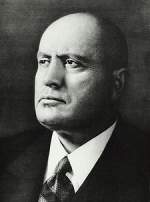
Born in Predappio, Italy, in 1883, the son of a blacksmith and a teacher, Mussolini was well-read, largely self-educated and had worked as a schoolteacher and a socialist journalist. He was arrested and jailed for leading demonstrations in the Forli province against the Italian war in Libya in 1911-12. The editor of Avanti!—the Socialist Party newsletter in Milan, Mussolini was one of the most effective socialist journalists in Europe. In 1912, at the age of 29, he took the reins of the Italian Socialist Party at the Congress of Reggio Emilia, preaching a strict Marxist socialism that prompted Vladimir Lenin to write in a Russian publication that the party of the Italian socialist proletariat has taken the right path.
The mortar bomb that exploded during a training exercise on February 22, 1917, killed four of Mussolini's fellow soldiers. He escaped alive, but spent six months in the hospital, where 44 fragments of shell were removed from his body. Discharged from the army after his release from the hospital, Mussolini headed back to Milan, where he started his own newspaper, Il Popolo d'Italia (The People of Italy), in which he published articles attacking those in Italy who voiced anti-war sentiments.
In the immediate post-war period, Mussolini and a group of fellow young war veterans founded the Fasci di Combattimento, a right-wing, strongly nationalistic, anti-Socialist movement named for the fasces, the ancient Roman symbol for discipline. Fascism grew rapidly in the 1920s, winning support from rich landowners, the army and the monarchy; the growing strength of Mussolini and his now notorious black-shirt militia led King Vittorio Emmanuel III to invite the charismatic leader to form a coalition government in 1922. By 1926, Benito Mussolini, now known as Il Duce, had consolidated power for himself, transforming Italy into a single-party, totalitarian state that would later, alongside Japan and Adolf Hitler's Germany, return to the battlefield against the Allies in the Second World War. (History.com)
1918 World War 1: Montana passes law against sedition:
Swept along by hysterical fears of treacherous German spies and domestic labor violence, the Montana legislature passes a Sedition Law that severely restricts freedom of speech and assembly. Three months later, Congress adopted a federal Sedition Act modeled on the Montana law. [For further information, click here]
1919 Various:
Weimar: Church and State: Bavarian Cardinal Michael Faulhaber refuses to order the ringing of bells and the showing of flags of mourning after the assassination of Eisner by Count Arco-Vally, a Catholic. (THP)
USSR: US Ambassador William C. Bullit and the radical journalist Lincoln Steffens, leave Paris for a meeting in Russia with the Bolsheviks.
1921 Mongolia: After Russian forces under Baron Roman von Ungern-Sternberg drove the Chinese out of Mongolia, the Bogd Khan is reinstalled as emperor. [For further information, click here.]
1924 Broadcasting: US President Calvin Coolidge becomes the first president to deliver a radio broadcast from the White House. Coolidge's speech, commemorating the 192nd anniversary of George Washington's birth, is broadcast from his White House study and heard live on forty-two radio stations from coast to coast. In 1921, Coolidge's predecessor, Warren G. Harding, was the first president to ever have a speech broadcast on the radio. On 5 November 1921, a presidential message from Harding was broadcast in code from Washington, DC, to twenty-eight countries. The message was related to the imminent Washington Conference for Limitation of Armament, which opened in the nation's capital six days later.
1933 Various:

Germany: Education: Hermann Goering persuades the Prussian government to decree the gradual abolition of the interdenominational schools and reintroduce religious instruction in the vocational schools "for political reasons." (THP)
Holocaust: The American Jewish Congress, American Jewish Committee and B'nai B'rith (Sons of the Covenant) form a joint conference committee to examine the German situation. (THP) [See: What Was the Nature of Hitler's Anti-Semitism?]
Disarmament: At Geneva, the German Delegation leaves the conference when Mr. Henderson, President of the Disarmament Conference, refuses to accept a German amendment to the French draft resolution on standardization.
1939 Countdown to World War II: Neville Chamberlain tells an audience in Blackburn, "Ships, guns and ammunition are produced by our shipyards and factories with an increased acceleration . . . . Even if the whole world is against us we will win."
1940 World War II: From a letter from Reichsleiter Martin Bormann to Reichsleiter Alfred Rosenberg:
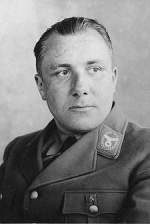
Christianity and National Socialism are phenomena which originated from entirely different basic causes. Both differ fundamentally so strongly that it will not be possible to construct a Christian teaching which would be completely compatible with the point of view of the National Socialist ideology; just as the communities of Christian faith would never be able to stand by the ideology of National Socialism in its entirety . . . . The Fuehrer's deputy finds it necessary that all these questions should be thoroughly discussed in the near future in the presence of the Reich leaders who are especially affected by them.
1941 Holocaust: Various:
Netherlands: More than 400 Jews are seized in Amsterdam and deported. Some die in Buchenwald, the rest in the stone quarries of Mauthausen. (THP)
Poland: An order is issued stating that any Pole selling food to a Jew outside the Warsaw ghetto will automatically be sentenced to three months hard labor, and the ghetto ration is reduced to three ounces of bread a day. (THP)
1942 World War II: President Roosevelt to MacArthur: Get out of the Philippines:
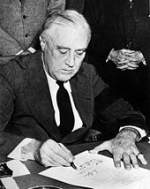
The Philippines had been part of the American commonwealth since it was ceded by Spain at the close of the Spanish-American War. When the Japanese invaded China in 1937 and signed the Tripartite Pact with fascist nations Germany and Italy in 1940, the United States responded by, among other things, strengthening the defense of the Philippines. General MacArthur was called out of retirement to command 10,000 American Army troops, 12,000 Filipino enlisted men who fought as part of the U.S. Army, and 100,000 Filipino army soldiers, who were poorly trained and ill prepared. MacArthur radically overestimated his troops' strength and underestimated Japan's determination. The Rainbow War Plan, a defensive strategy for U.S. interests in the Pacific that was drawn up in the late 1930s and later refined by the War Department, required that MacArthur withdraw his troops into the mountains of the Bataan Peninsula and await better-trained and -equipped American reinforcements. Instead, MacArthur decided to take the Japanese head on—and he never recovered.
On the day of the Pearl Harbor bombing, the Japanese destroyed almost half of the American aircraft based in the Philippines. Amphibious landings of Japanese troops along the Luzon coast followed. By late December, MacArthur had to pull his forces back defensively to the Bataan Peninsula—the original strategy belatedly pursued. By January 2, 1942, the Philippine capital of Manila fell to the Japanese. President Roosevelt had to admit to himself (if not to the American people, who believed the Americans were winning the battle with the Japanese in the Philippines), that the prospects for the American forces were not good—and that he could not afford to have General MacArthur fall captive to the Japanese. A message arrived at Corregidor on February 20, ordering MacArthur to leave immediately for Mindanao, then on to Melbourne, Australia, where "You will assume command of all United States troops."
MacArthur at first balked; he was fully prepared to fight alongside his men to the death if necessary. MacArthur finally obeyed the president's order in March. (History.com)
1943 World War II: Various:
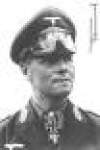
Rommel's drive at Kasserine loses momentum:
While Montgomery chased Rommel through Libya towards Tunisia, the disorganized and inexperienced Americans slowly advanced on Tripoli; an event Eisenhower would eventually conclude was a strict violation of 'every recognized principle of war.' However, Allied commanders remained confident that Rommel's forces were far too depleted to offer any continued resistance in North Africa and that his expulsion from the theater was only a matter of time. After Rommel smashed their forces on February 14, 1943, the Americans fell back to solidify their defensive position. Five days later, Rommel probed these defensive lines and determined that the point of least resistance was located at the Kasserine Pass, located in the Tunisian Dorsal Mountains. The next day, he personally led the attack with his heavy Tiger I tanks firing their 88mm guns to great effect. The American defenses rapidly crumbled for a number of reasons.
FDR to Stalin:
I desire to state that I share your regret that the Allied effort in North Africa did not proceed in accordance with the schedule. It was interrupted by unexpected heavy rains that made the roads extremely difficult for both supplies and troops proceeding to the front lines from our landing ports. These rains made the fields and mountains impassable. I am fully aware of the adverse effect on the common Allied effort of this delay and I am taking every possible step to begin successful aggressive action against the forces of the Axis in Africa at the earliest possible moment with the purpose of accomplishing their destruction . . . . I understand the importance of a military effort on the continent of Europe at the earliest date practicable in order to reduce Axis resistance to your heroic army. You may be sure that the American war effort will be projected on to the European Continent at as early a date subsequent to success in North Africa as transportation facilities can be provided by put maximum effort. We wish for the continuance of the success of your heroic army which is an inspiration to all of us.
1943 Death: Sophie Scholl of the White Rose:

Sophie Magdalena Scholl, former student of philosophy and biology at the University of Munich in Germany, [is] executed by guillotine for her role in the White Rose nonviolent Nazi resistance group.
Scholl was born just 21 years earlier and spent a carefree childhood in Ludwigsburg and later, in Ulm. Although she initially joined Bund Deutscher Maedel at age 12 (as required), she quickly grew disenchanted with the group and began to identify strongly with the dissenting political views of some of her teachers, family, and friends. While serving the required six months in the National Labor Service prior to enrolling in university, Scholl began exploring the philosophy and practice of passive resistance, which she was almost immediately able to put into practice at the University of Munich the following spring, where she quickly fell in with the compatriots of her older brother, Hans Scholl. Initially a forum to entertain the abstract questions of budding young intellectuals, the group (which dubbed itself the White Rose) quickly moved towards taking a more active role in resistance to the Nazi regime.
How should an individual act under a dictatorship? What obligations, or indeed, power, did a group of half a dozen students have in the face of such stifling repression? As Sophie and her brother watched as their father was jailed for a critical remark made about Hitler to an employee, other group members shared stories of atrocities witnessed during war service (of the six members, all but Sophie were male). It was agreed that some sort of action was necessary. But what?
The group began distributing a series of leaflets urging other Germans to join them in resistance against the Nazi regime. The earlier leaflets were mailed anonymously to addresses all over Germany (copied out of the phone book), but later, the group began targeting the student population. In Fellow Fighters in the Resistance, they wrote: "The name of Germany is dishonoured for all time if German youth does not finally rise, take revenge, smash its tormentors. Students! The German people look to us." Passive was their philosophy, but their language was most certainly not. In February 1943, the group targeted the last of the series of six leaflets for distribution in the main building of the university. Scholl and her brother volunteered to distribute the leaflets one morning, and nearly were able to disappear into the throng of students once classes let out, before being spotted by a janitor and quickly arrested. After hours of interrogation, Scholl had almost established her innocence, until investigators searched the siblings' apartment and found proof of her guilt. At this point, she switched tactics and proudly stood by her actions, stating that she was obligated to act in accordance with her conscience and would freely do the same thing again, and this in the face of increasingly hostile and derogatory questioning by her interrogator.
Scholl, her brother Hans, and White Rose member Christoph Probst were subsequently brought to trial in the People's Court in a crowd of hand-picked Nazi supporters and in front of the notorious Nazi judge Roland Freisler. Found guilty, each was allowed to give a brief statement. Scholl proclaimed, "Where we stand today, you will stand soon." Hans and Sophie Scholl and Probst were executed just hours after their trial. Sophie Scholl's last words were: "Such a fine, sunny day, and I have to go, but what does my death matter, if through us thousands of people are awakened and stirred to action?" Indeed, the pamphlet that led to Scholl's death did have that very effect. Smuggled out of Germany later that year, the Allied Forces seized on it and dropped thousands of propaganda copies German cities later that year, retitled as "Manifesto of the Students of Munich".
In the post World War II era, the Geschwister Scholl (Scholl siblings) have since attained an almost mythical stature in German culture and history, with numerous monuments and schools dedicated in their honor (as well as the famous University plaza the siblings crossed the day of their arrest). In a nationwide 2003 poll, Sophie and her brother Hans were voted the fourth most important Germans of all times, above Bach, Goethe and Einstein.
1945 Various:


Just as the Jewish leader Moses ordered his forces to do to the conquered peoples thousands of years ago, so today the Red soldiers under the command of Jewry behave today wherever they reach through treachery or force: Men are murdered or shipped abroad as slaves, women and girls are raped and defiled! "You shall devour the peoples!" How incomprehensible is the pious order of the "god" Jehovah to the Jews! In our day it has become clear as the Red slave army of World Jewry has broken into the heart of Europe! When this terrible war finally ends, the spirits of the murdered and tortured will rise from their mass graves in eternal accusation. The millions of faces of Cain, bastards brought into the world, will join the accusations. A horror will spread across the world. [For the full text, Click here.]
[See: Did Julius Streicher Deserve his Death Sentence?]1946 Various:
Cold War: George Kennan sends "long telegram" to State Department:The American chargé d'affaires in Moscow, sends an 8,000-word telegram to the Department of State detailing his views on the Soviet Union, and U.S. policy toward the communist state. Kennan's analysis provided one of the most influential underpinnings for America's Cold War policy of containment.
Kennan was among the U.S. diplomats to help establish the first American embassy in the Soviet Union in 1933. While he often expressed respect for the Russian people, his appraisal of the communist leadership of the Soviet Union became increasingly negative and harsh. Throughout World War II he was convinced that President Franklin D. Roosevelt's spirit of friendliness and cooperation with Soviet leader Joseph Stalin was completely misplaced. Less than a year after Roosevelt's death, Kennan, then serving as U.S. chargé d'affaires in Moscow, released his opinions in what came to be known as the "long telegram."
The lengthy memorandum began with the assertion that the Soviet Union could not foresee "permanent peaceful coexistence" with the West. This "neurotic view of world affairs" was a manifestation of the "instinctive Russian sense of insecurity." As a result, the Soviets were deeply suspicious of all other nations and believed that their security could only be found in "patient but deadly struggle for total destruction of rival power." Kennan was convinced that the Soviets would try to expand their sphere of influence, and he pointed to Iran and Turkey as the most likely immediate trouble areas. In addition, Kennan believed the Soviets would do all they could to "weaken power and influence of Western Powers on colonial backward, or dependent peoples." Fortunately, although the Soviet Union was "impervious to logic of reason," it was "highly sensitive to logic of force." Therefore, it would back down "when strong resistance is encountered at any point." The United States and its allies, he concluded, would have to offer that resistance.
Kennan's telegram caused a sensation in Washington. Stalin's aggressive speeches and threatening gestures toward Iran and Turkey in 1945-1946 led the Truman administration to decide to take a tougher stance and rely on the nation's military and economic muscle rather than diplomacy in dealing with the Soviets. These factors guaranteed a warm reception for Kennan's analysis. His opinion that Soviet expansionism needed to be contained through a policy of "strong resistance" provided the basis for America's Cold War diplomacy through the next two decades. Kennan's diplomatic career certainly received a boost—he was named U.S. ambassador to the Soviet Union in 1952.
After leaving government service, Kennan served on the faculty of the Institute for Advanced Study until his death in 2005 at the age of 101. (History.com)
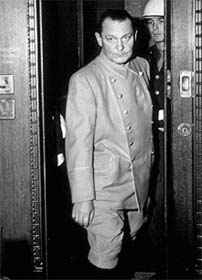

2001 War crimes: A U.N. war crimes tribunal convicts three Bosnian Serbs on charges of rape and torture in the first case of wartime sexual enslavement to go before an international court. (AP)
Edited by Levi Bookin (Copy editor)
levi.bookin@gmail.com
FAIR USE NOTICE: This site may contain copyrighted material the use of which has not always been specifically authorized by the copyright owner. We are making such material available in our efforts to advance understanding of historical, political, human rights, economic, democracy, scientific, environmental, and social justice issues, etc. We believe this constitutes a 'fair use' of any such copyrighted material as provided for in section 107 of the US Copyright Law. In accordance with Title 17 U.S.C. Section 107, the material on this site is distributed without profit to those who have expressed a prior interest in receiving the included information for research and educational purposes. If you wish to use copyrighted material from this site for purposes of your own that go beyond 'fair use', you must obtain permission from the copyright owner.
Please note that the list-owner and the moderator are not responsible for, and do not necessarily approve of, the random ads placed on our pages by our web server. They are, unfortunately, the price one pays for a 'free' website.